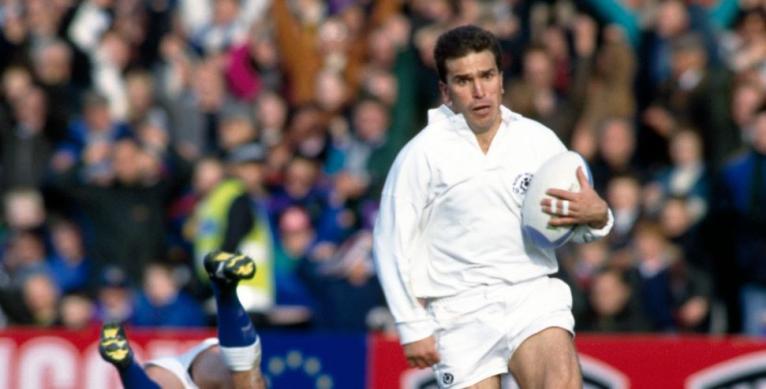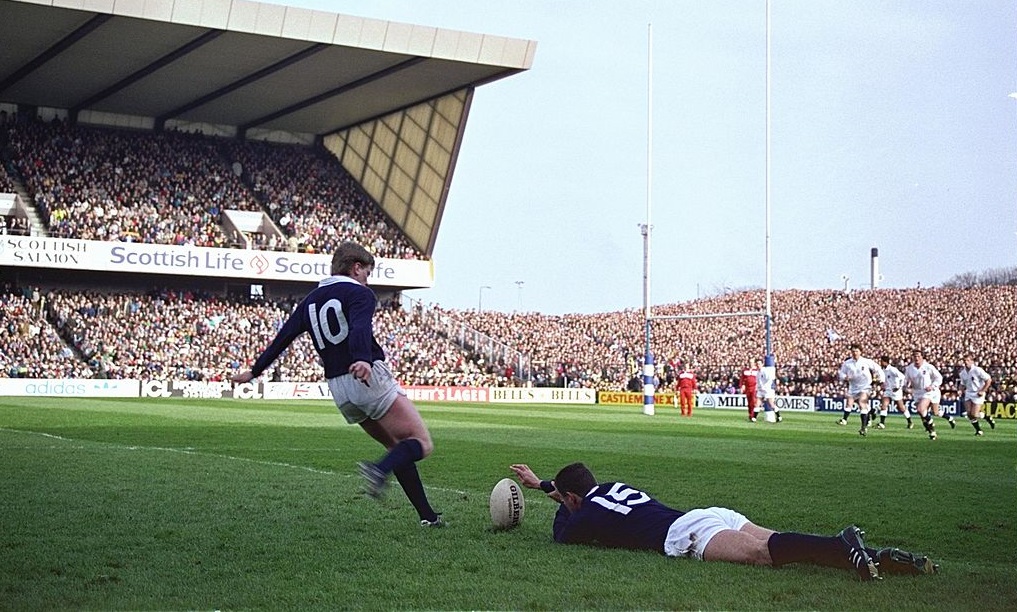The day England’s WAGS wound up the Scots

Scotland legend Iwan Tukalo has recalled how the sight of England’s wives and girlfriends on the hallowed Murrayfield turf got the blood boiling before it properly kicked off in the 1990 Grand Slam decider.
Already fired-up by an emotional squad gathering and ‘Everest-type’ speech by coach Jim Telfer, Scotland left their base at the Braid Hills Hotel in Edinburgh determined to send England home to think again.
But further fuel was added to the pre-match fire when Scotland’s players spotted their opposite numbers’ partners being interviewed live on TV in the corner of the pitch.
One of the magic #CalcuttaCup moments….
A wonderful back-row move as well!!! @ScotlandTeam #GuinnessSixNations pic.twitter.com/wTrKN5zRvo
— Guinness Men's Six Nations (@SixNationsRugby) February 8, 2020
“Before kick-off, we went out on the pitch in our blazers as normal to see what the conditions were like and we could see, over in the far corner, the girlfriends and wives of the England team being interviewed on TV. That was another thing that fuelled us because, in our mind, they hadn’t earned the right to set foot on the sacred turf of Murrayfield,” the winger recalled in the My Life in Rugby column, published in The Rugby Paper last month.
Tukalo, who scored 15 tries in 37 Tests and started all four matches in the Grand Slam-winning campaign, also described how the biggest day of their rugby lives had started much more serenely.
Telfer and fellow coach Ian McGeechan had shielded the players from the Press in the week and instead thrown the spotlight on England as the favourites to complete the clean sweep.
But as Tukalo and room-mate, David Sole, packed their bags to prepare to go downstairs to one last team meeting before departure to Murrayfield, they were left in no uncertain terms about the magnitude of the match.
“We were warned off talking to press to make sure we didn’t give England any ammunition, while all the time the coaches talked them up,” Tukalo recalled.

“On the day of the game itself. I was sharing a room with David Sole at the Braid Hills Hotel and Soley, who didn’t say much at the best of times, was quieter than ever. You could hear a pin drop and that was making me more and more nervous.
“So I asked him if he minded me putting on the TV as a distraction while we started to pack our bags, The credits for Grandstand started and the programme opened up with a montage of great Scotland-England sporting encounters. We stopped what we were doing and looked at each other and went “oh my god!”. It suddenly dawned on us how big a deal it all was.”
Tukalo added: “When we went down to the team room, there was a Scotland jersey placed on each of the chairs in a circle, one for each player. The number wasn’t showing, just the thistle.
“Creamy (Telfer) told us to sing ‘Flower of Scotland’ and after we’d done that, he told us to pick up a jersey and present it to the relevant player. I got No.6, JJ’s (John Jeffrey), and as I gave it to him, I said, ‘I won’t let you down, I’ll be there’.
“When we all walked out of that room, we knew that each and every one of us was not going to leave anything out on that park. In our mind, it was our day, come hell or high water. I’m getting emotional thinking about it now.”
Sole’s slow march out of the Murrayfield tunnel is the stuff of Calcutta Cup legend and Tukalo, who was the last in line, says the noise of the crowd that day will stay with him forever.
“I was the last in line as always; it was a superstition of mine. So by the time I made it onto the pitch the noise was just incredible.
“I’d played at Murrayfield several times before but I had never heard anything like that. The crowd never let up throughout the 80 minutes, every yard of ground we made they were behind us.
Tony Stanger’s try and three Craig Chalmers penalties were enough to beat an England team that went up blind alley after blind alley, only creating one real moment of magic in attack when Jerry Guscott broke through to score.
“A combination of the crowd, everyone giving 120 per cent and England getting transfixed on trying to do stuff they wouldn’t normally do, helped us to get us the (13-7) win,” said Tukalo, who’s 5’9 tall and weighed around 12 stone at the time.
“I’m just glad it was Tony Stanger who got the chance down his wing because I’d have never been able to reach up that high and grab the ball, the short arse that I am!”


































